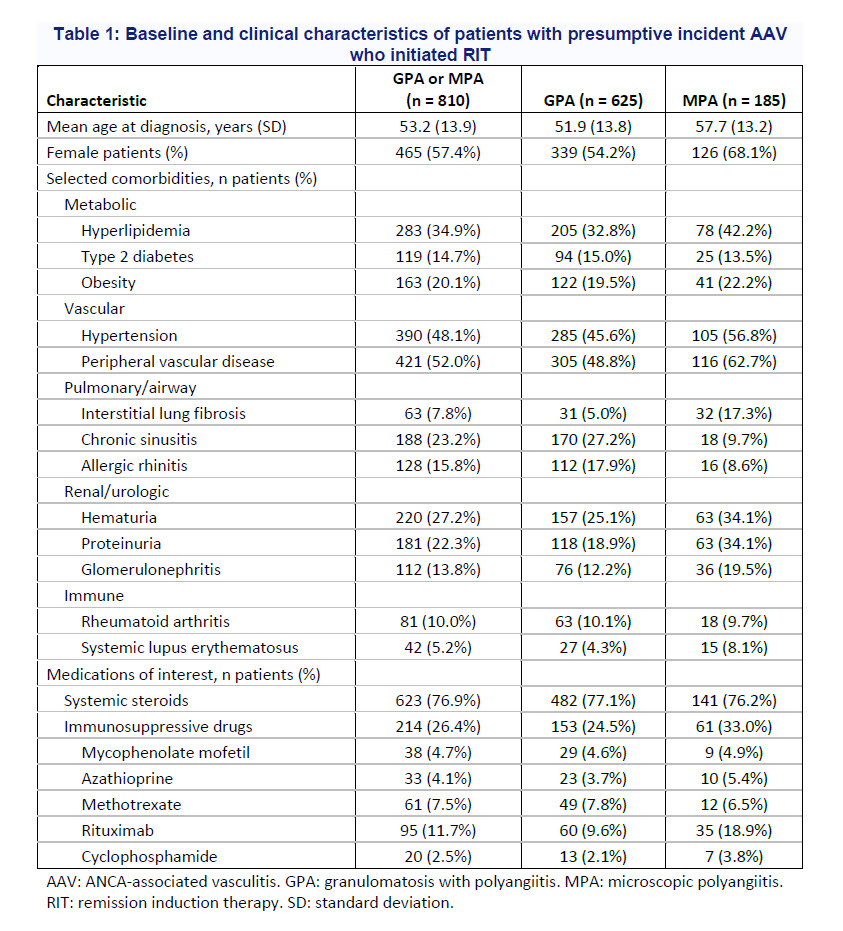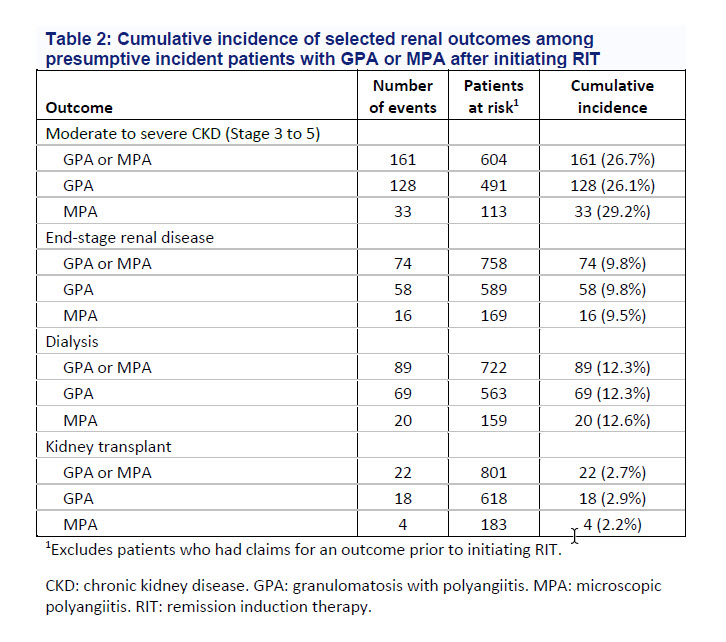Session Information
Date: Tuesday, November 14, 2023
Title: (2370–2386) Vasculitis – ANCA-Associated Poster III: Biomarkers & Renal Outcomes
Session Type: Poster Session C
Session Time: 9:00AM-11:00AM
Background/Purpose: ANCA-associated vasculitis (AAV) is a group of rare autoimmune diseases characterized by inflammation and necrosis of small- to medium-sized blood vessels, commonly affecting the kidneys. Clinical characteristics have been used to categorize AAV into different subtypes, including microscopic polyangiitis (MPA) and granulomatosis with polyangiitis (GPA). This study describes baseline characteristics and renal outcomes among patients with GPA or MPA who initiated remission induction therapy (RIT).
Methods: An observational retrospective cohort study using data from the MarketScan® Commercial and Medicare Supplemental claims database was conducted among patients diagnosed with GPA (ICD-10-CM M31.3, M31.30, M31.31) or MPA (M31.7) between April 1, 2016 and January 31, 2023. Patients must have been ≥18 years old on the GPA or MPA diagnosis date (index date) and had ≥6 months of continuous medical and prescription enrollment prior to the index date (the baseline period). The study period was chosen to coincide with the availability of ICD-10 diagnosis codes for GPA and MPA. All available data prior to the index date were used to determine whether AAV diagnosis was prevalent based on the presence of claims for AAV prior to the index date, or presumptive incident based on the absence of AAV claims before the index date. Renal outcomes during follow-up were examined among the subset of presumed incident GPA or MPA patients initiating RIT, based on their first use of rituximab or cyclophosphamide. Renal outcomes included moderate-to-severe chronic kidney disease (CKD), defined as Stage 3 or higher, end-stage renal disease (ESRD), dialysis, and kidney transplant. The cumulative incidence for all available follow-up was estimated for each renal outcome.
Results: A total of 4,878 patients with GPA or MPA were identified. Among these, 33% (n=1,604) were prevalent cases, and 67% (n=3,274) were presumptive incident cases, with a higher proportion of prevalent cases among patients with GPA (35%, n=1,477) than MPA (18%, n=127). RIT was initiated among 23% (n=625) and 32% (n=185) of patients with presumptive incident GPA and MPA, respectively. These patients were primarily female (54% for GPA, and 68% for MPA) and age (mean ± standard deviation [SD]) at diagnosis was 51.9 ± 13.8 for GPA, and 57.7 ± 13.2 for MPA, respectively (Table 1). The prevalence of comorbidities between patients with GPA or MPA was generally similar, though comorbidities with renal or vascular involvement tended to be more frequent in patients with MPA than with GPA (Table 1). Claims for systemic steroids and immunosuppressive drugs were similar for patients with GPA (77% and 24%) and MPA (76% and 33%), respectively. The cumulative incidences of CKD, dialysis, ESRD, and kidney transplant among patients with GPA or MPA were 27%, 12%, 10%, and 3%, respectively, and were similar across AAV subtypes (Table 2).
Conclusion: This study indicates that there remains a substantial burden of renal disease among patients with presumptive incident GPA or MPA after initiating RIT in a real-world setting.
To cite this abstract in AMA style:
Oh S, Inguva S, Rane P, Tumminello B. A Real-World Descriptive Study of Renal Outcomes Among Patients with ANCA-Associated Vasculitis Initiating Remission Induction Therapy [abstract]. Arthritis Rheumatol. 2023; 75 (suppl 9). https://acrabstracts.org/abstract/a-real-world-descriptive-study-of-renal-outcomes-among-patients-with-anca-associated-vasculitis-initiating-remission-induction-therapy/. Accessed .« Back to ACR Convergence 2023
ACR Meeting Abstracts - https://acrabstracts.org/abstract/a-real-world-descriptive-study-of-renal-outcomes-among-patients-with-anca-associated-vasculitis-initiating-remission-induction-therapy/


